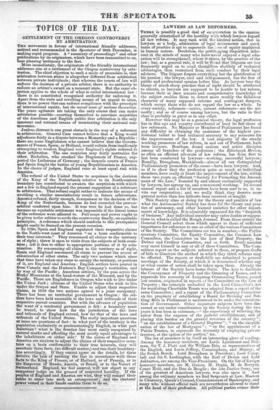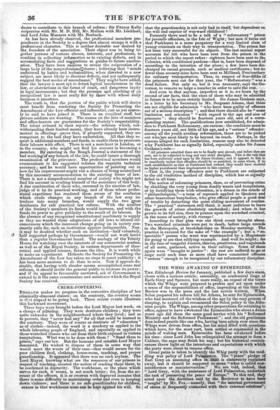LAWYERS AS LAW REFORMERS.
THERE is possibly a good deal of exaggeration in the onipion generally entertained of the hostility with which lawyers regard all law reform. It may rank with the kindred notion, that in lawyers as A body, admiration of legal refinements and quick turns of practice is apt to supersede the love of equity implanted in human nature. Doubtless, the pettifogging. disposition inhe- rent in the minds of many who have never enjoyed a legal edu- cation will be strengthened, where Waists, by the practice of the
tni law; but, as a general rule, it will bend that litigants are less frequently urged on to avail thenfOlves shabbily of technical advantages, than restrained front ,ch conduct by their legal advisers. T ini The litigant forgets everything but the gratification of his passion ; the lawyer, cool and self-possessed, has the fear of public and professional opinion before him. As lawyers bear the blame of much sharp practice that of right should be attributed to clients, so lawyers are "supposed to be hostile to law reform, beeause their at once minute and comprehensive knowledge of the subject enables Them to detect more readily the fallacious character of many supposed reforms and contingent dangers, which escape those who do not regard the law as a whole. In every society; reformers—active, earnest reformers--are the mi- nority ; and so of course among lawyers, but the ratio in that class is probably as great as in any other.
. However this may be as a general theory, the legal profession has in this age and country contributed at least its fair share of law reformers. No Minister or Member of Parliament has found any difficulty in obtaining the assistance of the highest pro- fessional talent to lend technical accuracy. to any measures for the improvement of the law. A vast majority of the steady working promoters of law reform, in and out of Parliament, have been lawyers. Bentham found zealous and active disciples among all branches of the profession ; the Edinburgh Review, so often an efficient advocate of law reform, has from first tc; last been conducted by lawyers—working, successful lawyers ; Romilly, Brougham, Mackintosh—almost all our distinguished Parliamentary promoters of the cause—have been lawyers. And, as if to show that the profession quite as much as individual members, have really at heart the improvement of the law, within these two years an efficient "Society for Promoting the Amend- ment of the Law," founded by and almost exclusively supported by lawyers, has sprung up, and commenced working. Its second annual report and a list of members have been sent to us, to in- vite our cooperation • and we really think they deserve more general notice than has hitherto been received or sought. This Society aims at doing for the theory and practice of law what the Astronomical Society has done for the theory and prac- tice of astronomy, and other learned societies for other depart- ments of knowledge. It is admirably organized for the "despatch of business." Any individual member may enter doubts or sugges- tions in what is called the Rough Journal. From these entries the General Council select those which appear to them of sufficient importance for reference to one or other of the various Committees of the Society. The Committees are ten in number,—the Parlia- mentary Committee, the Equity Committee, the Common law Committee, the Committee on the Law of Real Property, the Debtor and Creditor Committee, and so forth. Every member may enrol himself in an or all of these Committees. The Com- mittees report on the subjects referred to them, or prepare drafts of bills to illustrate the method in which they think reforms may be effected. The reports or draft-bills are submitted to general meetings of the Society, at which it is determined whether any or what course of action shall be taken upon them. Already the labours of the Society have borne fruits. The Acts to facilitate the Conveyance of Property and the Granting of Leases, and to supersede the necessity of Assigning Outstanding Terms, passed last session, originated in reports of the Committee on the Law of Property ; 'the principle embodied in the Lord Chancellor's Act for regulating Charitable Trusts was adopted from a report of the same Committee ; and a report of the Parliamentary Committee on the propriety of establishing a Board for Revising and Set- tling Bills in Parliament is understood to be under the considera- tion of Government. Other important subjects have been dis- cussed or are under consideration by the Society during the two years it has been in existence,—" the expediency of relieving the suitor from the expense of the judicial establishment, and of placing this burden on the general revenues of the country " ;
on the establishment of a General Register "; " on the simplifi- cation of the law of Mortgages " ; " on the appointment of a Public Trustee, to supersede the necessity of employing private trustees, at the option of the parties," &c. i The list of members is by itself an interesting piece of reading. Among the honorary members, are Lords Lyndhurst and Den- man, Sir T. J. Platt and Sir William Erle, as representatives of the English, and Lords Jeffrey, Cunningham and Murray, of the Scotch Bench. Lord Brougham is President ; Lord Camp- bell and Sir S. Lushington, with the Earl of Devon and Lord Ashburton, are among the Vice-Presidents. On thelist of foreign honorary members, are M. Guizot, M. Dupin M. de Berryer, Count Mole, and the Duc de Broglie; the late justice Story, one of the greatest of American lawyers, was also upon it And among the ordinary members we find Sergeants at Law, Masters in Chancery, Queen's Counsel, Commissioners of Bankruptcy, and many who without official rank are nevertheless allowed to stand at the head of their profession. All political parties evince their desire to contribute to this branch, of reform: Sir Fitzroy Kelly cooperates with Mr. M. D. Hill, Mr. Hallam with Mr. Lockhart, and Lord John Manners with Mr. Roebuck.
As has been already observed, the professional members pre- ponderate in the Society to a degree that almost stamps it with a professional character. This is neither desirable nor desired by the founders of the association. Their object was to bring to- gether persons of various classes, interests, and professions, to combine in collecting information as to existing defects, and in accumulating facts and suggestions as guides to future amelior- ation. They have been anxious to secure the cooperation of a large body of the nonprofessional:classes ; believing that "minds unfettered by habits and technicalities, when directed to a new subject, are most likely to discover defects, and not unfrequently suggest the best modes of amendment." They might have added, that the lawyer is most apt to detect logical incoherences in the law, or obstructions in the forms of court, and dangerous laxity in legal instruments ; but that the pressure apd pinching of an inexpedient law is most really felt by those with whose daily business it interferes.
The truth is, that the portion of the public which will derive most benefit from rendering the Society for Promoting the Amendment of the Law efficient and influential, can as yet scarce- ly.be said to have joined it. There is an excellent staff, but private soldiers are wanting. The names on the lists of members and office-bearers are guarantees for the Society's respectability. The talent evinced in their reports—the reforms which, not- withstanding their limited means, they have already been instru- mental in effecting—prove that, if properly supported, they are competent to the task they have undertaken. All that they re- quire is additional members and funds, to enable them to prosecute their labours with effect. There is not a merchant in London, or in the country, who might not find his account in becoming a member. By entering in the Rough Journal a statement of the bad working of any branch of the law, he could insure a thorough examination of the grievance. The professional members would communicate to his suggested reforms the requisite technical accuracy ; and he would have opportunities of pointing out in how far his improvement might run a chance of being neutralized by this necessary accommodation to the existing forms of law. There is not a nonprofessional member of society who might not find his account in availing himself of the assistance of this body. A due combination of those who, unversed in the niceties of law, judge of it by its practical working, and of those whose profes- sional experience has rendered them aware of the confusion which crude changes in any branch of the law may in- troduce into many branches, would supply the two great desiderata for safe practical law reform. With the number of the Society's members its funds would increase, and with the funds its power to give publicity to the result of its labours. In the absence of any recognized constitutional machinery to supply as they are wanted those adaptations of old laws to altered cir- cumstances which the incessant change going on in society con- stantly calls for, such an institution appears indispensible. Nay, it may be doubted whether such an institution—half voluntary, 4 half supported perhaps by Government—would not work better than a regular Government board. The analogy of the Trinity House for watching over the interests of our commercial marine, as well as of the Royal Society, in various departments of theo- retical and applied science, favours the idea. It is worth while to make an experiment. Hitherto the Society for Promoting the Amendment of the Law has taken no steps to court publicity : it has been more anxious to do than to seem. Now it appears de- sirable, that having with slender means accomplished some real reforms, it should invite the general public to increase its power ; and if its appeal be favourably answered, ask of Government to extend to it the same countenance and assistance which the Royal Society has received.



























 Previous page
Previous page